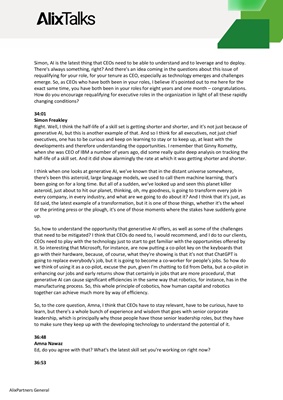
can regulate first, I guess the US was trying to catch up. I think many people would say maybe it was
probably better that the US set out a little bit. But there was a large summit in London, outside of
London last week, where leaders from most of the large countries around the world came together
with the big large language model developers, and there's a sort of global consensus that thinking
through some of these risks is actually really important. So, the US is kind of charging ahead. Now
the question is how is that going to impact individual corporate use cases? I think that's still a little
way out and to be seen
32:00
Amna Nawaz
Simon, how are CEOs viewing what's unfolding here in America, both on the development side and
also to see how this regulation plays out?
32:06
Simon Freakley
I think everybody is trying to assimilate as quickly as possible this developing landscape from a
human point of view, appropriately what regulation is doing to protect society as well as business,
from some sort of dysmorphic outcomes of what might happen, but also how to understand the
regulatory environment so one can operate within it. And so, I think that people are reading as much
as they can as fast as they can to orientate themselves, but understanding that there are specialists
like Michael and others that are at the forefront of this, and they are hungry for insight and advice,
how they should best steward their companies through what is a fast developing landscape.
32:50
Michael Kratsios
I think one thing that's sort of, I think, positive for the larger corporate community is that the general
trend in the US on AI regulation is that it should remain industry and use case specific. So, if you are
a medical diagnostics company and you want to create an AI powered medical diagnostic, it will still
be approved by the FDA. There may be new tests that need to be done because it's AI powered, but
there won't be a new agency you have to go to. At least that's generally where Washington is
moving. So, for folks who every day interact with the FDA or interact with the Department of
Transportation, your regulators will likely stay the same. The question is now, how will AI be
incorporated into the work that they're already doing?
33:32
Amna Nawaz
I want to get to some of the wonderful audience questions that are coming in right now. And thank
you to all of you out there, keep sending those in. I'll work them in now. Simon, let's put this one to
you. One of our audience members is writing "Which types of use cases do you see where
businesses will purchase external AI services, and where do you see them developing them
internally?"
33:53
Simon Freakley
I imagine a situation where every major corporation is going to have its own large language model,
or maybe several. I mean, I spoke to a chief executive last week, for instance, an organization
employing 120,000 people. Now, they were in the tech space. They are currently working on 20 large
language models of their own. Now, I think that some of those have been foundational models